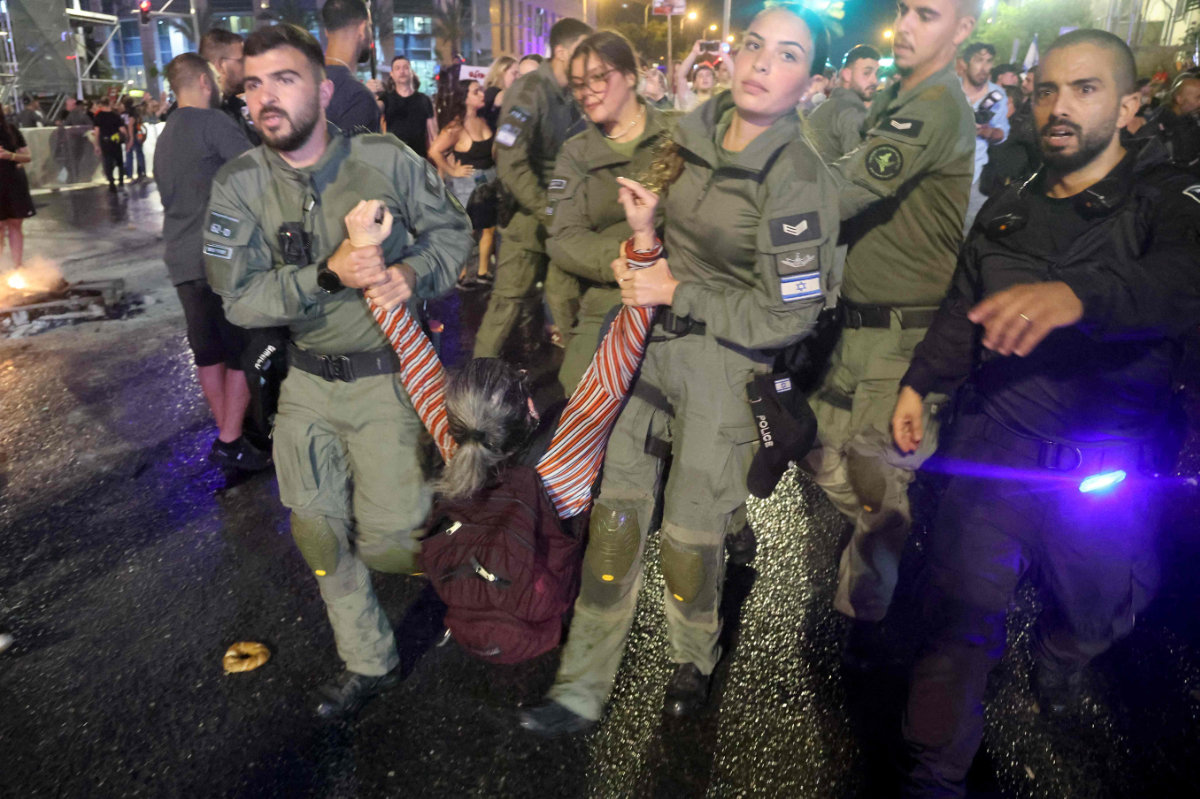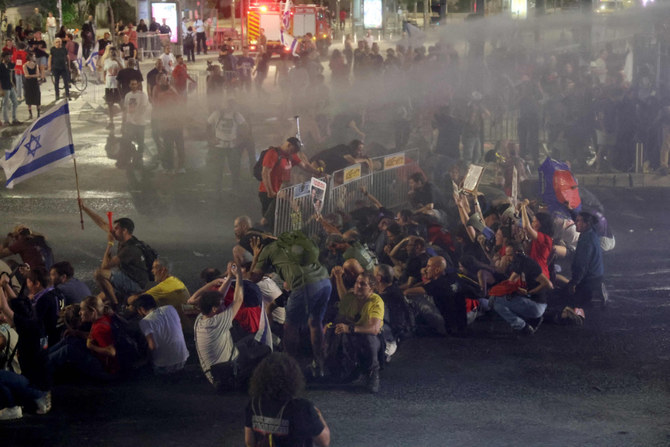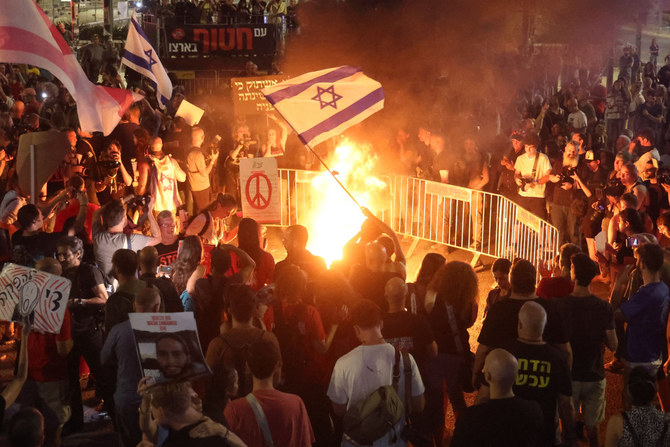JERUSALEM: Scuffles between Israeli police and protesters erupted in Tel Aviv on Saturday after thousands gathered to demonstrate against the government and demand that it bring back the hostages being held by Hamas in Gaza.
Meanwhile, a small US military vessel and what appeared to be a strip of docking area washed up on a beach near the southern Israeli city of Ashdod, not far from the US-built pier on which the Israeli military said humanitarian aid is moving into the Palestinian territory.
Also on Saturday, Israeli bombardments were reported in northern and central Gaza.
Some protesters in Tel Aviv carried photos of the female soldiers who appeared in a video earlier in the week showing them soon after they were abducted during the Hamas attack on Israel on Oct. 7 started the war between Israel and Hamas. Some held banners reading “Stop the war” and “Help.” They called on the government to reach a deal to release the dozens of hostages still in captivity.
The protesters also called for the resignation of Israeli Prime Minister Benjamin Netanyahu and demanded new elections.
“We all saw the video, we could not stay at home after the government abandoned all these people,” said Hilit Sagi, from the group “Women Protest for the Return of All Hostages.”
Divisions among Israelis have deepened over how Netanyahu has handled the war against Hamas after the attack that killed about 1,200 people and saw 250 others taken hostage. Israel says around 100 hostages are still being held in Gaza, along with the bodies of around 30 more.

Israeli police detain a protester during a demonstration in Tel Aviv on May 26, 2024, by relatives and supporters of Israelis taken hostage by Palestinian militants in Gaza in the October 7 attacks. (AFP)
“Basically they are not doing enough in order for the hostages to come back, either with military force, with (a) hostages’ deal, negotiating. Nothing is being done,” said Snir Dahan, uncle of hostage Carmel Gat, still in captivity in Gaza.
Earlier in the week, the bodies of three hostages killed were recovered from Gaza, Israel’s army said Friday. The army said they were killed on the day of the attack and their bodies were taken to Gaza. The announcement came less than a week after the army said it found the bodies of three other Israeli hostages killed on Oct. 7.
Around half of the 250 hostages taken by Hamas and other militants have been freed, most in swaps for Palestinian prisoners held by Israel during a weeklong ceasefire in November.
Netanyahu’s government has faced increasing pressure, both at home and abroad, to stop the war and allow humanitarian aid into the enclave that is home to 2.3 million Palestinians, almost 80 percent of whom have been displaced.
Also this week, three European countries announced they would recognize a Palestinian state, and the chief prosecutor for the International Criminal Court requested arrest warrants for Israeli leaders, along with Hamas officials.
On Friday the International Court of Justice ordered Israel to end its military offensive in the southern Gaza city of Rafah and to open the nearby border crossing for crucial humanitarian aid. The top United Nations court also said Israel must give war crimes investigators access to Gaza.
However, the judges stopped short of ordering a full ceasefire across the entire Palestinian territory, and Israel is unlikely to comply with the court’s ruling. South Africa accuses Israel of committing genocide against the Palestinians during the war in Gaza, which Israel vehemently denies.
“We were hoping the war would end,” said Islam Abu Kamar, who moved from Gaza City to Rafah following the ground operation launched by Israel after the Hamas attack in October.
In the past two weeks, more than a million Palestinians have fled Rafah as Israeli forces pressed deeper into the city. Israel’s takeover this month of the Rafah border crossing, a key transit point for fuel and supplies for Gaza, has contributed to bringing aid operations to near collapse, the UN and relief groups say.
Israel says it needs to invade Rafah to destroy Hamas’ last stronghold. Egypt said it agreed to send UN humanitarian aid trucks through the Kerem Shalom border crossing, Israel’s main entry point into southern Gaza. But it remains unclear if the trucks will be able to enter because fighting still rages in Rafah.
Israel said aid is moving into the Palestinian territory through northern Gaza and via the US-built pier. On Saturday, a small US military boat and what appeared to be a strip of docking area washed up on a beach near the southern Israeli city of Ashdod.
The US Central Command said four of its vessels supporting the humanitarian aid mission were affected by rough seas with two of them anchoring near the pier off the Gaza coast and another two in Israel.
US officials said no injuries were reported and the US is working with the Israeli army to recover the vessels, Central Command said.
American officials hope the pier at maximum capacity can bring the equivalent of 150 truckloads of aid to Gaza daily. That’s a fraction of the 600 truckloads of food, emergency nutritional treatments and other supplies that USAID says are needed each day to bring people in Gaza back from the brink of famine and address the humanitarian crisis brought on by the 7-month-old Israel-Hamas war.
Israeli bombardments continued in the enclave on Saturday with reports of strikes northern and central Gaza. Witnesses said people were killed in strikes on the cities of Jabaliya and Nuseirat.
More than 35,000 Palestinians have been killed in the war, according to the Health Ministry, which doesn’t distinguish between combatants and civilians.

















